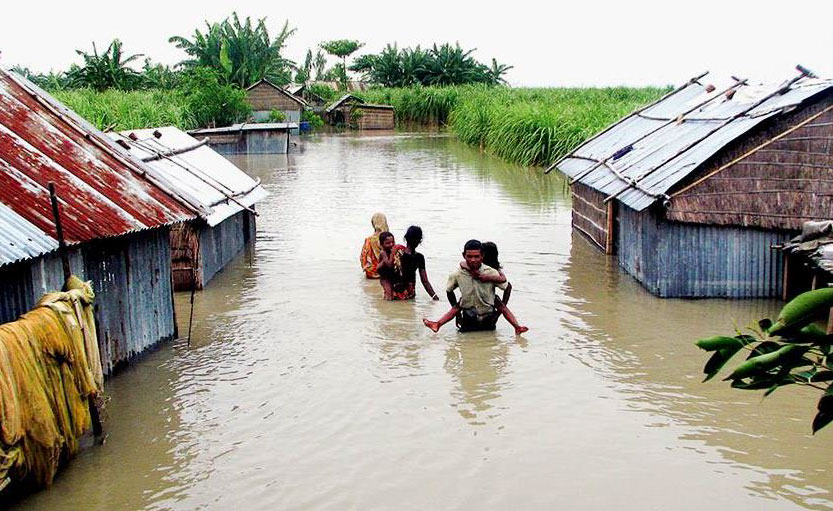World's poor to suffer most unless developed countries act fast on climate change

Storms and hurricanes are becoming more severe due to warmer sea temperatures. Low lying island nations now experience annual flooding with the seawater contaminating groundwater supplies. Whether it is flooding or drought, or any other climate related catastrophic event, the poor nations of the world and their populations suffer most.
The late Henry Kendall was a Nobel Laureate in Physics, a professor at MIT, a founding member of the Union of Concerned Scientists and the Chairman of its governing board. In 1992, he spearheaded an effort to warn humanity of eventual disaster unless it changed its ways. The appeal was signed by 1700 of the world's leading scientists including then a majority of science Nobel Laureates.
Its major thrust was to 'bring environmentally damaging activities under control', to 'move away from fossil fuels', to 'cut greenhouse gas emissions', to 'halt deforestation, ... loss of agricultural land, and the loss of terrestrial and marine plant and animal species.'
The words 'global warming' were not used for even they did not anticipate the surge in atmospheric CO2 levels, which are now at record highs. Deforestation continues unabated and the loss of species has become so rapid it is estimated to be at least 1000 to 10,000 times greater than the national rate. This mass extinction is the worst die-off since the dinosaurs disappeared 65 million years ago.
The world, however, has been able to stabilize the stratospheric ozone layer through a sustained effort to alter the use of refrigerants. That it can springs hope for other areas -- particularly global warming just given concerted attention at the Conference of Parities (COP23) held in Bonn (November 6-17) at the UN climate change secretariat.
While the conference was in progress, on November 13, another 'Warning to Humanity ...' this time with 15,364 signatories from 184 countries appeared in the journal Bioscience. The first figure is enough to give pause. Population has soared both of humans and ruminant livestock, another cause of environmental degradation. They note fresh water resource per capita declines, rising CO2 levels, increasing temperature change, deforestation and a drastic decline in vertebrate species to 40 percent of 1970.
The world did not heed the first call; with global warming at hand, perhaps it will the second. There was an encouraging sign at COP23: Local and regional leaders responded to the UN Environment Program's Emissions Gap Report. They signed the Bonn-Fiji Commitment for faster climate action to help deliver the Paris Accords.
Some effects of not heeding the first call are already apparent. Storms and hurricanes are becoming more severe due to warmer sea temperatures. Low lying island nations, like the Maldives, now experience annual flooding with the seawater contaminating groundwater supplies. Whether it is flooding or drought, or any other climate related catastrophic event, the poor nations of the world and their populations suffer most. Lack of resources, infrastructure, emergency services and preparedness are the usual reasons. It comes down to money and through it training and expertise.
Another consequence is on the quality of food. Rising CO2 levels speed up plant growth increasing carbohydrates through plant sugars and diluting nutrition due to reduced minerals and protein. The nutrient quality of our food is expected to fall as CO2 levels rise this century.
Again, the effect will be worst felt by the world's poorer populations relying on a plant diet. Moreover, extreme weather events affect production, distribution, spoilage and contamination. Those hurt most will be people in a broad tropical belt of countries in Africa, Asia and the Americas; that is mostly the poor in our world.
It is a sobering thought after the Thanksgiving holiday feasting in the U.S. and Canada.
* DR. ARSHAD M. KHAN is a US-based former professor. Educated at King's College London and the University of Chicago, his multidisciplinary background has frequently informed his research. Thus he headed the analysis of an innovation survey of Norway and his work on SMEs has been widely cited. Over the years, his opinion pieces and comments have been published in print media such as The Dallas Morning News, Dawn (Pakistan), El Telegrafo (Ecuador), The Fort Worth Star Telegram, The CS Monitor and The Wall Street Journal among others. On the internet his pieces have appeared on Antiwar.com, Asia Times, Common Dreams, Countercurrents, Counterpunch, Modern Diplomacy, Pambazuka News, Telesurtv.net, Truth-out.org and many more. His work has been quoted in the U.S. Congress and published in its Congressional Record.
* THE VIEWS OF THE ABOVE ARTICLE ARE THOSE OF THE AUTHOR AND DO NOT NECESSARILY REFLECT THE VIEWS OF THE PAMBAZUKA NEWS EDITORIAL TEAM
* BROUGHT TO YOU BY PAMBAZUKA NEWS
* Please do not take Pambazuka for granted! Become a Friend of Pambazuka and make a donation NOW to help keep Pambazuka FREE and INDEPENDENT!
* Please send comments to [email=[email protected]]editor[at]pambazuka[dot]org[/email] or comment online at Pambazuka News.
